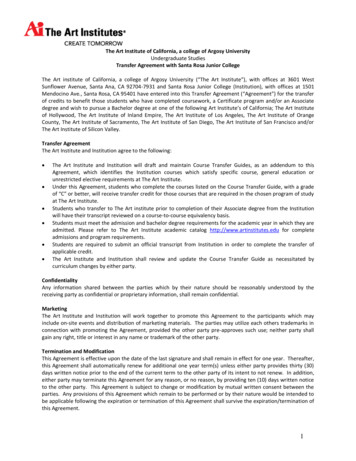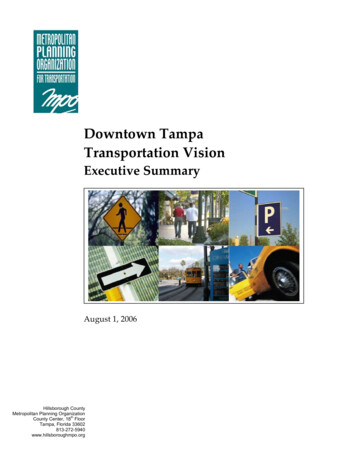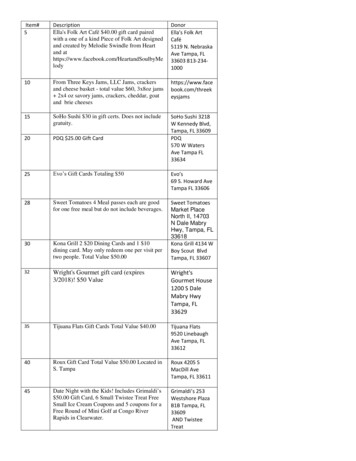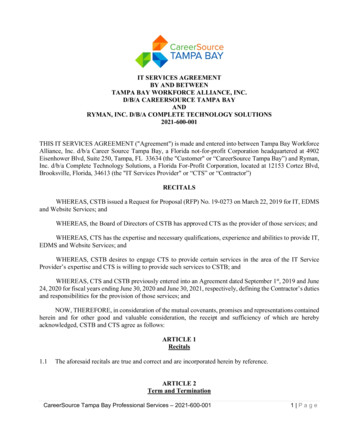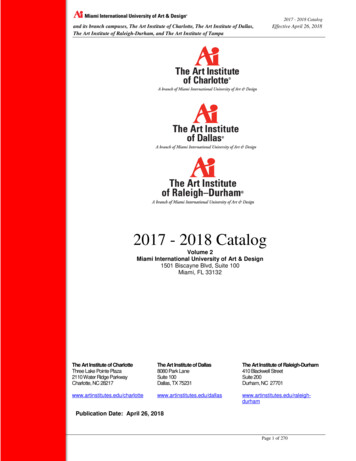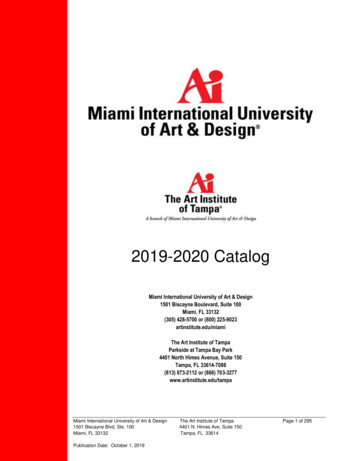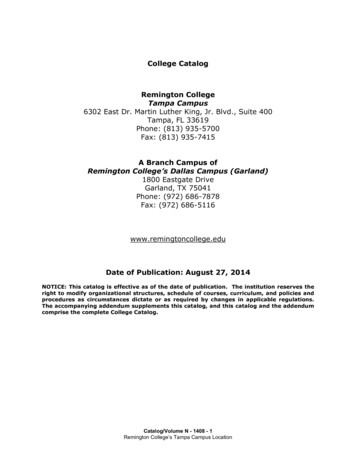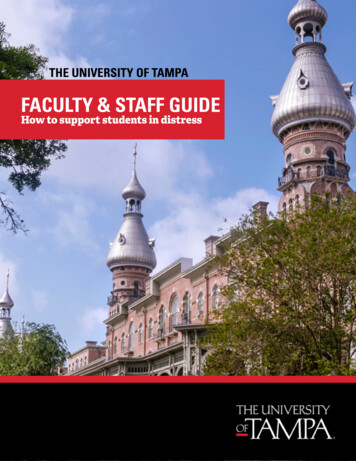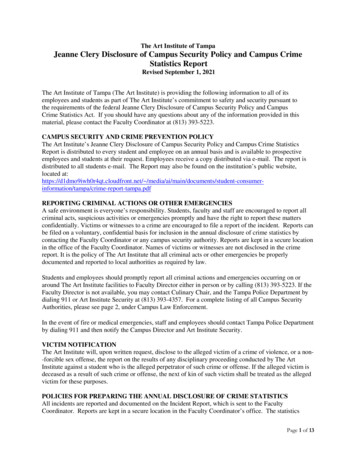
Transcription
The Art Institute of TampaJeanne Clery Disclosure of Campus Security Policy and Campus CrimeStatistics ReportRevised September 1, 2021The Art Institute of Tampa (The Art Institute) is providing the following information to all of itsemployees and students as part of The Art Institute’s commitment to safety and security pursuant tothe requirements of the federal Jeanne Clery Disclosure of Campus Security Policy and CampusCrime Statistics Act. If you should have any questions about any of the information provided in thismaterial, please contact the Faculty Coordinator at (813) 393-5223.CAMPUS SECURITY AND CRIME PREVENTION POLICYThe Art Institute’s Jeanne Clery Disclosure of Campus Security Policy and Campus Crime StatisticsReport is distributed to every student and employee on an annual basis and is available to prospectiveemployees and students at their request. Employees receive a copy distributed via e-mail. The report isdistributed to all students e-mail. The Report may also be found on the institution’s public website,located at:https://d1dmo9iwh0r4qt.cloudfront.net/ on/tampa/crime-report-tampa.pdfREPORTING CRIMINAL ACTIONS OR OTHER EMERGENCIESA safe environment is everyone’s responsibility. Students, faculty and staff are encouraged to report allcriminal acts, suspicious activities or emergencies promptly and have the right to report these mattersconfidentially. Victims or witnesses to a crime are encouraged to file a report of the incident. Reports canbe filed on a voluntary, confidential basis for inclusion in the annual disclosure of crime statistics bycontacting the Faculty Coordinator or any campus security authority. Reports are kept in a secure locationin the office of the Faculty Coordinator. Names of victims or witnesses are not disclosed in the crimereport. It is the policy of The Art Institute that all criminal acts or other emergencies be properlydocumented and reported to local authorities as required by law.Students and employees should promptly report all criminal actions and emergencies occurring on oraround The Art Institute facilities to Faculty Director either in person or by calling (813) 393-5223. If theFaculty Director is not available, you may contact Culinary Chair, and the Tampa Police Department bydialing 911 or Art Institute Security at (813) 393-4357. For a complete listing of all Campus SecurityAuthorities, please see page 2, under Campus Law Enforcement.In the event of fire or medical emergencies, staff and employees should contact Tampa Police Departmentby dialing 911 and then notify the Campus Director and Art Institute Security.VICTIM NOTIFICATIONThe Art Institute will, upon written request, disclose to the alleged victim of a crime of violence, or a non-forcible sex offense, the report on the results of any disciplinary proceeding conducted by The ArtInstitute against a student who is the alleged perpetrator of such crime or offense. If the alleged victim isdeceased as a result of such crime or offense, the next of kin of such victim shall be treated as the allegedvictim for these purposes.POLICIES FOR PREPARING THE ANNUAL DISCLOSURE OF CRIME STATISTICSAll incidents are reported and documented on the Incident Report, which is sent to the FacultyCoordinator. Reports are kept in a secure location in the Faculty Coordinator’s office. The statisticsPage 1 of 13
included in the annual crime report are prepared by compiling campus crime statistics and data fromcampus security authorities, local police departments, and other relevant information by the FacultyCoordinator.SECURITY AND ACCESS TO CAMPUS FACILITIESIt is the policy of The Art Institute that access to all campus facilities, be limited to authorized personnel,students, and invited visitors. Visitors are at all times subject to college policies and conduct codes.Students and employees are responsible for the conduct of their guests at all times. Students, staff, andfaculty are required to show a valid Art Institute identification card to gain access to campus facilities orservices and may be subject to search.ACCESS TO THE ACADEMIC BUILDINGSSecurity Desks are located at the first floor main entrance. After hours, the building is protected withelectronically locked security doors and devices including cameras and proper procedures are followed toensure limited access to secured areas. Exterior lighting is provided around the building and parking areas,and shrubs and hedges are kept low for safety reasons. Suspicious persons may be questioned or asked toleave by security personnel.CAMPUS LAW ENFORCEMENTPersons employed as security personnel on the main campus 4401 North Himes Ave, Suite 150, Tampa, FLare instructed in security, security problems, specific college rules and regulations, and the proper proceduresof how to enforce them. These procedures and rules and regulations are reviewed periodically to ensure thatsecurity needs are being met. Security personnel on campus report directly to the VP of Operations.Unarmed security personnel at the college are there at the direction of the college, and are to assist students,faculty and staff of The Art Institute. Someone is on duty during the hours of Monday – Thursday 7AM to10:30PM and Friday 7AM to 6PM. They are responsible for ensuring that persons entering the building areemployees, students, and their families or invited guests. They are authorized to request identification fromthose individuals, who are unfamiliar to them, and identification is required of all individuals arriving orleaving after the building is secured. They have the authority to evict unauthorized persons from the premises.Students are advised to carry their Art Institute Photo ID card at all times and to present them upon request.Security personnel may not make arrests, but are instructed to promptly contact the Tampa Police Departmentand the Faculty Coordinator if any illegal activity occurs.Campus Security Authorities at The Art Institute include police officers who can make arrests, securityofficers and any official of the institution who has significant responsibility for student and campus activities,including student discipline, student judicial affairs and student life. The president or his designee mayidentify other officials as it is deemed necessary. The Art Institute Campus Security Authorities are:TitleFaculty CoordinatorCulinary ChairPhone(813) 393-5223(951) 551-2141All members of the campus community are encouraged to report crimes or criminal activity to any campussecurity authority listed above. This list of Campus Security Authorities is subject to modification, and is notintended to be all inclusive due to changes in responsibilities within the institution.In accordance with the Clery Act regulations, Campus “Pastoral Counselors” and Campus “ProfessionalCounselors”, when acting as such, are not considered to be a campus security authority and are notrequired to report crimes for inclusion into the annual disclosure of crime statistics. The institution doesnot employee any “Pastoral” or “Professional Counselors”.Page 2 of 13
If a student is a victim of a crime and does not want to pursue action with The Art Institute’s system orthe criminal justice system, the student still may want to consider making a confidential report. With thestudent’s permission, the Faculty Coordinator can file a report on the details of the incident withoutrevealing the student’s identity. The purpose of the confidential report is to comply with the student’swish to keep the matter confidential, while taking steps to ensure the safety of the student and that ofothers. Reports filed in this manner are counted and disclosed in the annual crime statistics for The ArtInstitute. Reports are kept in a secure location in the office of the Faculty Coordinator.For additional information on Student Support Services, please contact the Faculty Coordinator at 813393-5211.The Art Institute maintains a Daily Crime Log of all criminal incidents reported to the institution. The DailyCrime Log includes the date and time the incident occurred, the nature of the offense, the location of theoffense, the offense allegedly committed and the disposition of the complaint if known. The Daily Crime Logis available for public inspection in the Monday – Thursday 7AM to 10:30PM and Friday 7AM to 6PMduring normal business hours.RELATIONSHIPS WITH LOCAL AND STATE POLICEThe Art Institute is located in Tampa, FL. The Art Institute maintains close working relationships with theTampa Police Department with periodic contact initiated by Art Institute designated campus securityauthorities to ensure that The Art Institute is aware of criminal offenses and arrests occurring on or nearthe campus so that they can be properly reported, and if necessary, provided for timely warning reports oncrimes that represent a continuing threat. The institution does not have any agreements or memoranda ofunderstanding with law enforcement. The data received from the Tampa Police Department is maintainedin the office of Student Affairs.TIMELY WARNINGSTimely warnings are provided to give students, faculty, and staff notification of crimes that have occurredon the institution’s geographic area and have been reported to campus security authorities or to localpolice agencies and are considered by the institution to represent a serious or continuing threat to studentsand employees. Timely warnings are not limited to violent crimes or crimes against person, but may bethreats to persons or to property. For example, there may be a rash of burglaries or motor vehicle theftsthat merit a warning because they represent a continuing threat to the campus community.The decision to issue a timely warning is based on the nature of the crime, the continuing danger to thecampus community, and the possible risk of compromising law enforcement efforts. The timely warningshould allow the members of the campus community protect themselves. Timely warning reports areprovided to the campus community in a variety of ways so that the warning will be able to reach the entirecampus community. The timely warning includes information about the crime that triggered the timelywarning and all information that will promote safety and that would aid in the prevention of similarcrimes. Once The Art Institute determines the content of the warning, timely warning reports are providedthrough a variety of mechanisms, including the emergency notification tool ‘My Campus Alert’, thestudent portal site, the school website, email, posters, letters and flyers and digital signage.Information regarding registration for the My Campus Alert System is available under the section of theClery Report titled “Emergency Notification” and in the Student Affairs office. Every student can updatetheir My Campus Alert System contact preference via the student portal homepage. Students can do thisvia the button entitled ‘Update Profile / My Campus Alert’.Page 3 of 13
PROGRAMS TO INFORM STUDENTS ABOUT CAMPUS SECURITYAll new Art Institute employees and students are instructed on crime awareness, prevention and campussecurity during orientation, and are encouraged to take responsibility for their own security, as well as thesecurity of their fellow classmates. During the New Student Orientation process new students receiveinformation on campus security policies and procedures, suggestions on how to avoid becoming a crimevictim, evacuation plans at the main campus and procedures for reporting any criminal activity or emergency.The program encourages students and employees to be responsible for their own security and the security ofothers.In addition The Art Institute engages in e-mail campaigns to provide educational information on health,safety and security. These campaigns include topics regarding prevention and awareness of rape, suicide,substance abuse and other relevant issues.Art Institute Faculty Coordinator, as well as Culinary Chair, encourage victims or witnesses to report crimeson a voluntary, confidential basis for inclusion in the annual disclosure of crime statistics. However, thenames of victims or witnesses who provide information on criminal offenses are not disclosed in the annualdisclosure of crime statistics and are maintained by The Art Institute in a secure location in the office StudentAffairs.PROGRAMS TO INFORM STUDENTS AND EMPLOYEES ABOUT THE PREVENTION OFCRIMESThe Art Institute also provides e-mail campaigns designed to heighten awareness of crime and its prevention.Topics included in these informational programs are personal safety, living in a city, crime prevention, basicsafety, and neighborhood watch programs.Students are requested to review The Art Institute's Student Handbook where sections discussing CrimeAwareness and Campus Security and Student Conduct Policy can be found. Employees are requested toreview The Art Institute's Employee Handbook where information regarding Standards of Conduct andSafety can be found.OFF-CAMPUS STUDENT ORGANIZATIONSAt the present time, The Art Institute does not have any off-campus student organizations.DRUG AND ALCOHOL POLICIESIn keeping with section 120(a) through (d) of The Higher Education Act of 1965, as amended,including the Drug-Free Schools and Communities Amendments of 1989 (Public Law 101-226), a“Drug Free Schools and Campuses” publication, the Drug Prevention Policy, is provided to all ArtInstitute students and employees annually.Pursuant to federal and state drug laws, employees and students are prohibited from the unlawfulmanufacture, distribution, possession, sale or use of illicit/illegal drugs. The Art Institute also enforcesstate laws regarding underage drinking. This prohibition applies while on the property of The ArtInstitute or when participating in any institutional activity. Students or employees who violate this policywill be subject to disciplinary action up to, and including, expulsion from The Art Institute or terminationof employment.For more information please refer to the Drug and Alcohol Prevention Program and the Drug-FreeWorkplace and Campus Program.https://d1dmo9iwh0r4qt.cloudfront.net/ ion/tampa/drugalcohol-policy-tampa.pdfPage 4 of 13
WEAPONS POLICYPossession or use of firearms, fireworks, ammunition, or other dangerous weapons or materials isprohibited on Art Institute owned or controlled property, at college-sponsored activities.PROGRAMS AND PROCEDURES REGARDING SEXUAL VIOLENCEDating Violence, Domestic Violence, Sexual Assault and Stalking are prohibited by the institution and areincompatible with the institution’s goal of providing a healthy educational environment for students,faculty, staff and guests. Sexual offenses involve the physical contact of a sexual nature which is againstone’s will or without one’s consent. Consent requires a voluntary, positive agreement between theparticipants to engage in specific sexual activity. Sexual activity that is nonconsensual would include, butis not limited to: nonconsensual sexual intercourse or penetration (vaginal, oral, or anal) by any means; nonconsensual sexual contact (any touching of intimate body parts with any body part or objectwithout consent); sexual contact with a person while knowing or having reason to know that the person isincapacitated by any means including alcohol or other drugs.Sexual violence can be perpetrated by a stranger or acquaintance. Both men and women can be victims orperpetrators. Domestic Violence - (i) A felony or misdemeanor crime of violence committed— (A) By acurrent or former spouse or intimate partner of the victim; (B) By a person with whom the victimshares a child in common; (C) By a person who is cohabitating with, or has cohabitated with, thevictim as a spouse or intimate partner; (D) By a person similarly situated to a spouse of the victimunder the domestic or family violence laws of the jurisdiction in which the crime of violenceoccurred, or (E) By any other person against an adult or youth victim who is protected from thatperson’s acts under the domestic or family violence laws of the jurisdiction in which the crime ofviolence occurred. Dating Violence-Violence committed by a person who is or has been in a social relationship of aromantic or intimate nature with the victim. (i) The existence of such a relationship shall bedetermined based on the reporting party’s statement and with consideration of the length of therelationship, the type of relationship, and the frequency of interaction between the personsinvolved in the relationship. (ii) For the purposes of this definition— (A) Dating violenceincludes, but is not limited to, sexual or physical abuse or the threat of such abuse. (B) Datingviolence does not include acts covered under the definition of domestic violence. Sexual Assault - An offense that meets the definition of rape, fondling, incest, or statutory rape.Any sexual act directed against another person, without the consent of the victim, includinginstances where the victim is incapable of giving consent. A. Fondling—The touching of theprivate body parts of another person for the purpose of sexual gratification, without the consent ofthe victim, including instances where the victim is incapable of giving consent because of his/herage or because of his/her temporary or permanent mental incapacity. B. Incest—Sexualintercourse between persons who are related to each other within the degrees wherein marriage isprohibited by law. C. Statutory Rape—Sexual intercourse with a person who is under thestatutory age of consent. Stalking (i) Engaging in a course of conduct directed at a specific person that would cause areasonable person to— (A) Fear for the person’s safety or the safety of others; or (B) Suffersubstantial emotional distress. (ii) For the purposes of this definition— (A) Course of conductmeans two or more acts, including, but not limited to, acts in which the stalker directly, indirectly,or through third parties, by any action, method, device, or means, follows, monitors, observes,surveils, threatens, or communicates to or about a person, or interferes with a person’s property.(B) Reasonable person means a reasonable person under similar circumstances and with similarPage 5 of 13
identities to the victim. (C) Substantial emotional distress means significant mental suffering oranguish that may, but does not necessarily, require medical or other professional treatment orcounseling.Educational programs promoting the prevention and awareness of rape, acquaintance rape, domesticviolence, dating violence, stalking and other sex offenses are provided to all incoming and current studentsand new and current employees annually via an interactive, online learning module. The training: Identifies domestic violence, dating violence, sexual assault and stalking as prohibited conduct; Defines what behavior constitutes domestic violence, dating violence, sexual assault, and stalking; Defines what behavior and actions constitute consent to sexual activity in Florida; Provides safe and positive options for bystander intervention that may be carried out by an individualto prevent harm or intervene when there is a risk of domestic violence, dating violence, sexualassault, or stalking against a person other than the bystander. For instance, in a situation involvingsexual assault, dating violence, or stalking, a bystander should minimize risk and:o Approach everyone as a friend;o Not be antagonistic;o Avoid violence;o Be honest and direct whenever possible;o Recruit help, if possible;o Keep safe; ando If things get out of hand, contact the police. Provides information on risk reduction so that students and employees may recognize warning signsof abusive behavior and how to minimize the risk of potential attacks. Domestic and dating abuseoften escalates from threats and verbal abuse to violence. And, while physical injury may be the mostobvious danger, the emotional and psychological consequences of domestic and dating violence arealso severe.o Warning signs of dating and domestic violence include:o Being afraid of your partner;o Constantly watching what you say to avoid a “blow up;”o Feelings of low self-worth and helplessness about your relationship;o Feeling isolated from family or friends because of your relationship;o Hiding bruises or other injuries from family or friends;o Being monitored by your partner at home, work or school; ando Being forced to do things you don’t want to do.o If you are being abused or suspect that someone you know is being abused, speak up orintervene.o Get help by contacting the Dean of Academic Affairs or other Art InstituteOfficialso Learn how to look for “red flags” in relationships so you can learn to avoidsome of those characteristics in future partnerso Consider making a report with local police or campus securityo Consider getting a protection from abuse order or no contact order from a localjudge or magisterial justice; ando Trust your instincts—if something doesn’t feel right in a relationship, speak upor end it.The online learning module is available to students at any time. To access the training, log on to thestudent portal and click on the link below:https://d1dmo9iwh0r4qt.cloudfront.net/ ion/ shared/ai-save-traininghandbook.ashx?modified 20181016171337&la enPage 6 of 13
Employees may access the training via the Learning Management System (LMS).Brochures on sexual assault issues are available in the Administrative Offices should a student or employeereport to the institution that he or she has been a victim of domestic violence, dating violence, sexual assault,or stalking . It is the student(s) option to notify the appropriate law enforcement authorities, including oncampus security authorities and local police. At the student’s request, Campus Director or other Art Instituteofficials will assist in notifying the proper authorities. Victims of sexual assault or rape should follow theserecommended steps: Go to a safe place following the attack. Do not shower, bathe, or destroy any of the clothing you were wearing at the time of the attack. It isimportant that evidence be preserved for proof of a criminal offense or assistance in obtaining aprotection order. Go to a hospital emergency room for medical care. A medical examination is the only way to ensure you are not injured and it could provide valuableevidence should you decide to prosecute. Even if you do not opt for forensic evidence collection,health care providers can still treat injuries and take steps to address concerns of pregnancy and/orsexually transmitted disease. Call someone to be with you; you should not be alone. You are also encouraged to preserve evidence by saving text messages, instant messages, socialnetworking pages, other communications, and keeping pictures, logs or other copies of documents, ifthey have any, that would be useful to hearing boards/ investigators or police.It is also recommended that victims call the Rape Crisis Hotline at (888) 617-3362. It is open 24 hours a dayand their counselors can help answer medical and emotional questions at any hour and in completeconfidence. Reporting the rape to the police is up to the victim, but it is important to remember that reportinga rape is not the same as prosecuting a rape. Victims are strongly encouraged to call the police and report therape. If the victim requests, The Art Institute staff will assist the victim in notifying law enforcementauthorities. If the victim needs additional counseling services beyond those identified below, The Art Institutestaff will assist in identifying off-campus counseling or mental health services.If the victim does not want to pursue action with The Art Institute’s system or the criminal justice system, thestudent still may want to consider making a confidential report. With the student’s permission, the CampusDirector, can file a report on the details of the incident without revealing the student’s identity. The purposeof the confidential report is to comply with the student’s wish to keep the matter confidential, while takingsteps to ensure the safety of the student and that of others.Any member of the college community may file a complaint against any student, staff or faculty member. The complaint shall be prepared in writing or in an incident report and directed to the Title IXCoordinator or his/her delegate. The written complaint or incident report should include the nature of the offense, date,approximate time and location of incident. The name of the victim, offender and any witness/smay be included.After any campus sexual assaults are reported, the victims of such crimes have the right to request that TheArt Institute personnel take steps or actions reasonably feasible to prevent any unnecessary or unwantedcontact or proximity with alleged assailants. These measures may include: Providing an escort to ensure the alleged victim can move safely between classes and activities. Ensuring that the alleged victim and the alleged perpetrator do not attend the same classes. Providing referral to counseling services or providers. Providing academic support services, such as tutoring.Page 7 of 13
Arranging for the victim to re-take a course or withdraw from a class without penalty.In addition, The Art Institute will take the necessary measures, within reason, to comply with any protectionorders, or no-contact orders, restraining orders, or similar lawful orders issued by a criminal, civil or tribalcourt which The Art Institute becomes aware.Victims will receive written notification about options for, and available assistance, in changing academic,transportation, and working situations, if so requested by the victim.Rape crisis centers or mental health agencies available to assist a victim of sexual offenses include: CrisisCenter of Tampa call 211 or Rape Crisis Center, Suncoast at (800) 962-2873. Written notification to studentsand employees about their rights and options regarding existing counseling, health, mental health, victimadvocacy, legal assistance, visa and immigration assistance, student financial aid and other services availablefor victims both on-campus and in the community will be provided.PROCEDURES TAKEN BY THE ART INSTITUTE ONCE SEXUAL ASSAULT, DATINGVIOLENCE, DOMESTIC VIOLENCE, OR STALKING HAS BEEN REPORTED;DISCIPLINARY ACTION AND SANCTIONSUpon learning of possible sexual violence involving a student, regardless of whether the victim chooses toreport the incident to law enforcement, The Art Institute will take immediate action to investigate orotherwise determine what happened. Such action may include, but is not limited to, speaking with thealleged victim, hereby referred to as the “Complainant”, the alleged perpetrator, hereby referred to as the“Respondent”, and other potential witness as appropriate and reviewing other evidence if available.Pending a final determination, the Title IX Coordinator or designee will take appropriate interimmeasures. These measures may include, but are not limited to, the imposition of a no-contact order and/oremployment, transportation, academic modifications. The Title IX Coordinator or designee may limit astudent or organization’s access to certain Art Institute facilities or activities pending resolution of thematter. The Title IX Coordinator may impose an Interim Suspension on the Respondent pending theresolution of an alleged violation when the Title IX Coordinator determines, at their sole discretion, that itis necessary in order to protect the safety and well-being of members of The Art Institute community.On-campus disciplinary procedures against students will be in accordance The Art Institute’s publishedSexual Misconduct & Relationship Violence Policy & Procedures for Resolving Complaints AffectingStudents, which are prompt, fair, and impartial from the initial investigation to the final result. The Title IXCoordinator will receive annual training related to domestic violence, dating violence, sexual assault, andstalking as well as how to conduct an investigation and hearing process that protects the safety of victims andpromotes accountability.The Respondent will receive written notice of the report and the nature of the alleged misconduct.He/She will be advised in writing of the investigation process and opportunity to provide any relevantevidence.The investigation will generally be conducted by the Dean of Student Affairs for the campus (or any otherindividual appointed by the Title IX Coordinator) if the Respondent is a student. If the Respondent is afaculty or staff member, Employee Relations will also participate in the investigation.The investigator will separately interview Complainant and Respondent. Both parties will be able toprovide evidence and suggest other witnesses to be interviewed. The investigator will interview otherrelevant witnesses and review any other available relevant evidence. Both the Complainant andRespondent can have another individual present during their own respective interviews. If thePage 8 of 13
Complainant or Respondent elects, they may have an attorney present during their own interview, but saidattorney may not advocate during the interview.The investigator will present all evidence to the Title IX Coordinator (or his/her designated Deputy TitleIX Coordinator). In all cases, the Title IX Coordinator or the designated Deputy Title IX Coordinatorwill be appropriately trained regarding handling and considering sexual misconduct and relationshipviolence cases.The Title IX Coordinator will weigh the evidence presented and decide whether additional evidence isnecessary for consideration. The Title IX Coordinator will determine whether it is more likely than notthat a violation occurred. The standard of evidence that will be used is preponderance of
around The Art Institute facilities to Faculty Director either in person or by calling (813) 393-5223. If the Faculty Director is not available, you may contact Culinary Chair, and the Tampa Police Department by dialing 911 or Art Institute Security at (813) 393-4357. For a complete listing of all Campus Security


